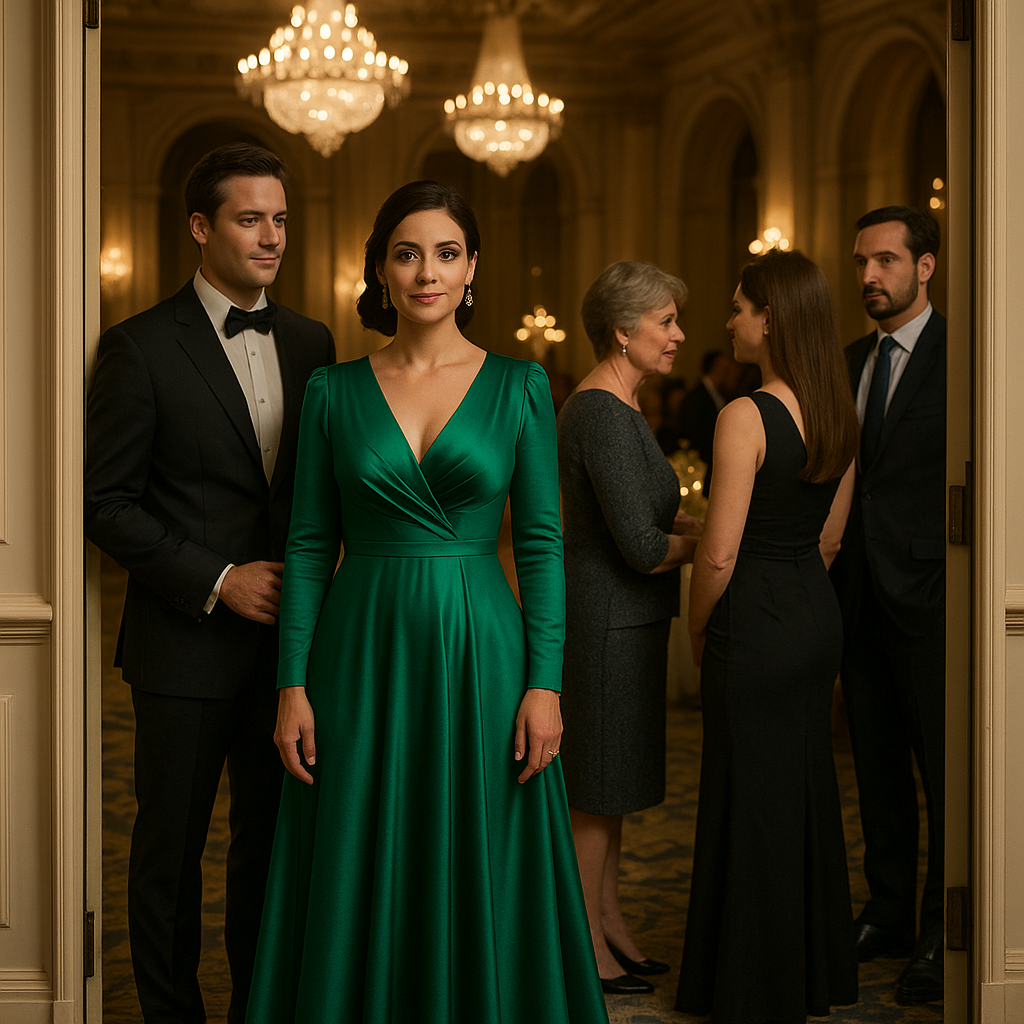“She’s stronger and better for you.”
I never imagined I’d hear those words come from my own mother.
The sentence hung in the air like a guillotine, cold and final, slicing away the last strands of comfort I had in that house. I stood frozen just outside the kitchen door, my hand still wrapped around a glass of lemonade, the condensation dripping onto the floor. I was supposed to be setting the table for dinner.
Mark—my boyfriend of three years—had only stepped away to grab us some drinks. That’s when I heard it.
My mother’s voice was low, calm, too practiced. “Audrey is sweet,” she said, like it was a flaw. “But let’s be honest, Elizabeth has always been the achiever. You deserve someone who will push you forward, not hold you back.”

Through the narrow crack in the door, I watched as Mark stood motionless. He wasn’t objecting. He wasn’t defending me.
“She just made Junior Partner,” my mother continued, her tone laced with pride. “And Audrey? Still pouring lattes and sketching strangers at the farmer’s market? What kind of future is that?”
I didn’t wait to hear more. I walked away, my heart pounding, my throat tight. That was my first mistake—not confronting it. I pretended I hadn’t heard anything. I told myself it didn’t mean anything.
But it did.
The signs came gradually, like petals falling off a dying flower. Canceled dates. Unexplained late nights. Conversations that used to be about “us” now revolved around how impressive my sister was.
Then came the day I decided to surprise him. I let myself into Mark’s apartment, holding a bag of groceries and a bottle of wine, thinking we’d cook together like old times.
That’s when I saw her blouse.
Elizabeth’s blouse. Cream silk with gold buttons, tossed carelessly across the arm of his couch like a flag marking territory. My stomach dropped, but I told myself maybe she had visited, maybe…
Then I heard it.
Laughter. Moans. Her voice.
I opened the bedroom door. Elizabeth didn’t scream. She didn’t cover herself. She just looked at me with an annoyed frown, as if I’d walked in during a boring meeting.
“You were going to find out eventually,” she said, not even reaching for the sheets. “Maybe this is for the best.”
I stood there trembling, my world burning down, and she wouldn’t even throw me a single spark of regret.
Later that night, when I confronted my mother, her response chilled me even further. “Don’t be so dramatic, Audrey. They make more sense together. He needs someone with direction. You’ll be fine—you always land on your feet.”
That was the moment I realized: to them, I was always the second choice. The gentle one. The expendable one.
“You’ve never really seen me,” I whispered. “Not once.”
By sunrise, my bags were packed. My best friend Jamie offered her couch in Chicago. I didn’t say goodbye to anyone. I left a note that simply said: Watch me thrive.
That phrase became my silent vow.

Chicago was cold, brutal, and exactly what I needed.
I found a studio apartment the size of a shoebox and a job I was wildly overqualified for: executive assistant to a junior associate at an investment firm.
His name was Patrick Reynolds—intense, brilliant, and perpetually surrounded by half-eaten takeout and a mountain of paperwork. During the interview, he asked, “Why this job?”
I smiled. “Because it pays. And I need a reset.”
He laughed. “Honest. I like that.”
He hired me on the spot.
The work was exhausting, but I found purpose in the order I created out of his chaos. Slowly, a rhythm developed. He noticed things about me others never had—my ability to streamline operations, anticipate problems, build trust. He treated me like a person with value, not just a placeholder until someone better came along.
Late one evening, he dropped a thick folder on my desk.
“Business plan,” he said. “My own firm. Sustainable ventures. Clients no one else pays attention to.”
I flipped through the pages. “You’re serious about launching this?”
“I need someone to help me run it. Not as an assistant. As an operations manager. I trust you.”
No one had ever said that to me before. I trust you.
It was risky. Terrifying. And it felt more right than anything I’d done in years.
“When do we start?”
The firm launched quietly. We called it Reynolds Capital Partners.
I handled the structure, he built the vision. Within a year, we had our first major client. Within two, we’d outgrown our shared desk space and moved into a corner suite.
Somewhere along the way, friendship blurred into something deeper. One night, we were reviewing quarterly reports on my living room floor, our shoulders touching, when he looked up from the spreadsheet.
“Marry me.”
I laughed. “You’re kidding.”
“I’m not. Be my partner in everything.”
Three months later, we were married at the courthouse with Jamie as our witness. No fanfare. No family.
Just us.
Our partnership thrived—at work and in life. Patrick remained the dreamer, and I was the one who grounded those dreams into strategy. We were a team in every way.

Five years in, Reynolds Capital was respected, lean, and quietly powerful.
That’s when the proposal landed on our desk: Meridian Investment Group. A merger that would expand our reach and our portfolio tenfold.
Patrick handed me a financial magazine one morning over coffee. “You’ll want to see this.”
My heart stopped. On page twelve, a brief article mentioned the impending bankruptcy of Davis & Associates—Elizabeth’s firm. Their expansion had backfired. And in smaller print: Mark Davis, now in compliance at Meridian Investment Group.
I set the magazine down.
“Do you still want to go through with the acquisition?” Patrick asked gently. “I’ll walk away if it’s too personal.”
His words filled my chest with warmth. Not because he offered to walk—but because he meant it.
“It’s just business,” I said, squeezing his hand.
To celebrate the acquisition, we planned a gala in Chicago.
It was Patrick’s idea to invite key players from Philadelphia. “Legal reps, partners, clients,” he said.
That included Elizabeth. And Mark. And my mother.
I told Patrick the whole story that night—how they’d betrayed me, dismissed me, written me off like I didn’t matter.
“Maybe it’s time they saw who you are now,” he said. “Not for revenge—for closure.”
When the RSVPs came back, all three were attending.
The night of the gala arrived, and I chose an emerald gown.
Not because it was flashy, but because it made me feel powerful. Calm. Whole.
I stood at the entrance to the grand hall, watching guests arrive beneath crystal chandeliers. My heart didn’t pound. I wasn’t nervous. I had already survived the worst night of my life. This was just the epilogue.

Then I saw them.
My mother. Elizabeth. Mark.
They looked older. Sharper. More tired.
My mother’s eyes widened when she saw me. “Audrey, darling!” she said, pulling me into an awkward hug. “You look… successful!”
“This is my husband, Patrick Reynolds,” I said smoothly.
Patrick extended a hand. “Pleasure to meet you. Audrey talks about her family often.”
Not true. But polite.
Elizabeth smiled, tight-lipped. “Your reputation precedes you,” she told Patrick.
“Our success has been a partnership since day one,” he said, his hand resting lightly on the small of my back. “Audrey’s brilliance built this company.”
The flicker of surprise in Elizabeth’s eyes almost made me laugh.
Mark stepped forward stiffly. “Mark Davis. Compliance officer.”
“Yes,” I said, holding his gaze. “The acquisition was finalized last month. Welcome to the Reynolds family of companies.”
The shift in power was almost physical. Mark, who once looked down on me, now reported to a company I helped create. Elizabeth, the golden child, was suddenly not so golden.
Later, by the dessert table, my mother sidled up to me. “Elizabeth and Mark… they’re having difficulties,” she said quietly. “Maybe you could put in a good word. Family helps family, right?”
I turned to her slowly. “Their performance will determine their future. Just as mine did.”
Her face went still.
After the gala, Patrick and I sat in our kitchen, barefoot and exhausted.
“How do you feel?” he asked, pouring us each a glass of wine.
“Lighter,” I said after a long pause. “Like I set something down I didn’t realize I was carrying.”
The strangest thing had happened that night. I didn’t feel triumphant. I didn’t even feel angry. I felt… grateful.
“If they hadn’t betrayed me,” I said slowly, “I never would’ve left. Never would’ve come to Chicago. Never would’ve met you. I never would’ve discovered what I’m capable of.”
Patrick kissed my hand. “You became everything they said you couldn’t be.”
I smiled. “Not despite them. But because of them.”
And that, I realized, was the greatest revenge of all.
The girl they underestimated became the woman who owned the room.
Not with cruelty. Not with spite.
But with grace, success, and the quiet power of someone who knows exactly who she is—and doesn’t need anyone’s permission to thrive.


